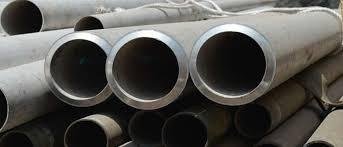SS 304 Pipe is one of the most reliable and widely used stainless steel pipes for industrial and commercial applications. Its high corrosion resistance, mechanical strength, and versatility make it an ideal solution for pipelines, structural systems, and fluid transport across industries. Beyond durability, SS 304 Pipes offer a long-term cost advantage, making them a preferred choice for businesses seeking both quality and economy.
In this blog, we will discuss the industrial and commercial applications of SS 304 Pipe, its benefits, and why investing in these pipes can save costs over time.
Why SS 304 Pipe is Ideal for Industrial Use
SS 304 Pipe is made from 304-grade stainless steel, containing 18% chromium and 8% nickel, giving it excellent corrosion resistance and durability. These properties make it suitable for harsh industrial environments, such as:
- Chemical Plants – Resistant to acids, alkalis, and industrial chemicals.
- Food and Beverage Processing – Hygienic surfaces prevent contamination.
- Water Treatment Facilities – Rust-resistant for water and wastewater systems.
- Oil and Gas Industries – Can withstand high temperatures and pressures.
Its ability to maintain structural integrity under stress and chemical exposure ensures long-lasting performance in industrial operations.
Key Commercial Applications of SS 304 Pipe
1. Water Supply Systems
SS 304 Pipes are widely used in municipal and commercial water pipelines due to their rust-free nature. They are durable, hygienic, and capable of handling varying water pressures, making them ideal for long-term installations.
2. Chemical and Pharmaceutical Industries
The resistance of SS 304 Pipes to corrosion, acids, and chemical reactions makes them perfect for transporting chemical solutions and pharmaceutical liquids safely. These pipes reduce maintenance costs and downtime caused by corrosion in regular steel pipes.
3. Food and Beverage Processing
SS 304 Pipes are standard in food processing plants, breweries, and dairy systems. Smooth surfaces prevent bacterial growth, ensuring compliance with hygiene standards while reducing contamination risks.
4. Architectural and Structural Uses
SS 304 Pipes are used in handrails, balustrades, decorative frameworks, and structural supports. Polished or brushed finishes enhance aesthetics, making them a popular choice for commercial buildings and architectural designs.
5. HVAC and Plumbing Systems
In heating, ventilation, and air conditioning systems, SS 304 Pipes are preferred for their durability and resistance to corrosion. They are also widely used in commercial plumbing systems for hot and cold water transport.
Cost-Benefit Analysis of SS 304 Pipe
While SS 304 Pipes are initially more expensive than carbon steel or welded steel pipes, they offer several long-term benefits that make them cost-effective:
- Long Lifespan – SS 304 Pipes last decades without corroding, reducing replacement costs.
- Low Maintenance – Minimal cleaning and repair needs save labor and material costs.
- Reduced Downtime – Industrial systems using SS 304 Pipes require less maintenance, keeping production continuous.
- Eco-Friendly and Recyclable – 100% recyclable material aligns with sustainable practices, often reducing disposal costs.
- Hygienic and Safe – Avoids contamination risks in food, beverage, and pharmaceutical applications, reducing losses.
By considering these factors, businesses realize that investing in SS 304 Pipes reduces total cost of ownership over the system’s life cycle.
Types of SS 304 Pipe for Industrial and Commercial Projects
- Seamless SS 304 Pipe – High strength and uniform construction make it suitable for high-pressure and chemical industries.
- Welded SS 304 Pipe – Cost-effective and ideal for low-pressure commercial systems, including water pipelines and decorative structures.
- ERW SS 304 Pipe (Electric Resistance Welded) – Perfect for architectural and structural applications due to ease of installation and durability.
Selection Guidelines for Industrial Projects
1. Determine Pressure and Temperature Requirements
- Seamless pipes for high-pressure and high-temperature conditions.
- Welded pipes for moderate or low-pressure applications.
2. Check Diameter and Wall Thickness
- Select pipes based on fluid flow, pressure, and structural requirements.
- Thicker walls are necessary for chemical plants and high-pressure pipelines.
3. Surface Finish Considerations
- Polished for hygienic applications.
- Brushed or matte for decorative and architectural use.
4. Compliance and Standards
- Ensure compliance with ASTM, ANSI, DIN, or IS standards to guarantee performance and reliability.
Installation and Maintenance Tips
- Proper Handling – Avoid scratches and physical damage during transportation and installation.
- Correct Cutting and Welding – Use stainless steel-approved tools to maintain corrosion resistance.
- Support and Alignment – Proper clamps and brackets prevent sagging or stress points.
- Compatible Fittings – Use SS 304 compatible elbows, tees, and flanges to avoid galvanic corrosion.
- Regular Inspection and Cleaning – Prevent pitting, stains, or contamination for long-term durability.
Conclusion
SS 304 Pipe is a versatile, durable, and corrosion-resistant solution for industrial and commercial projects. Its applications range from water pipelines and chemical transport to food processing and architectural systems. While the initial cost may be higher than conventional pipes, its long lifespan, low maintenance, and hygienic properties make it a cost-effective choice in the long run.
For industries and businesses seeking strength, durability, and reliability, SS 304 Pipe is the ideal solution that balances performance and economic efficiency. Choosing the right type, size, and installation method ensures maximum return on investment and long-lasting performance for years to come.
